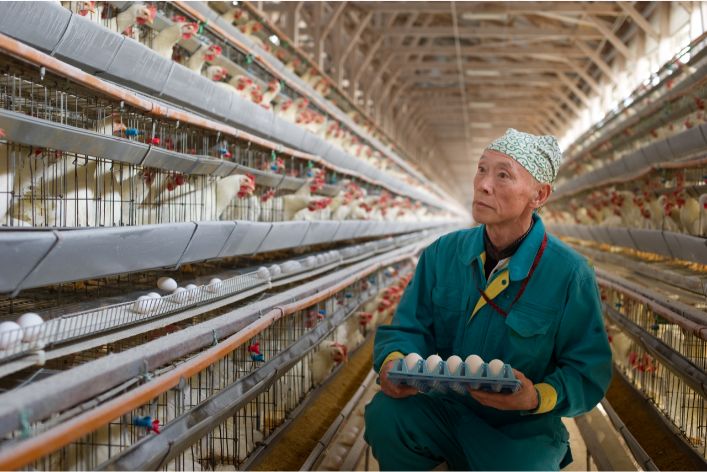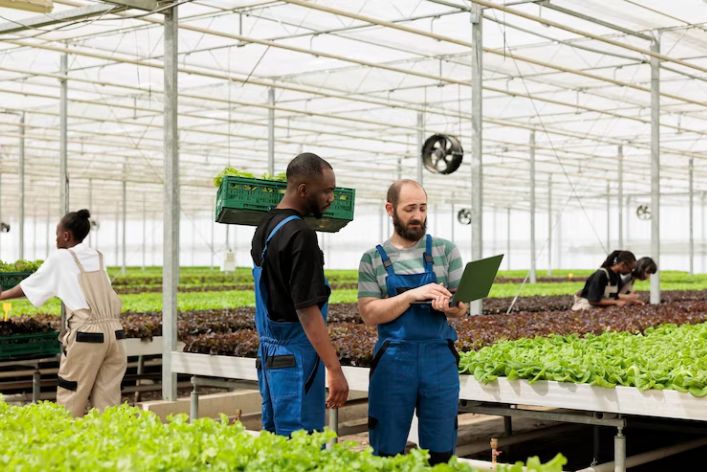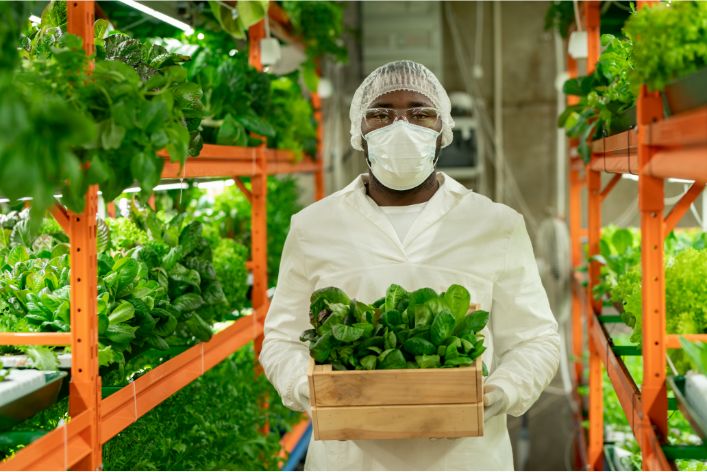Introduction
Agriculture is the bedrock of Nigeria’s economy, accounting for 23% of the country’s GDP. farming is an integral part of agriculture that involves the cultivation of crops such as grain, legumes, vegetables, and fruits.
Crop farming provides food, raw materials, and income for millions of Nigerians, and it is a crucial sector in the country’s quest for economic development.
Crop farming is an important area of agriculture that contributes significantly to the country’s overall development. It provides food for the population, supports rural livelihoods, and generates income for farmers and other players in the agricultural value chain.
Crop farming also provides raw materials for the manufacturing sector, supports export earnings, and reduces the country’s dependence on imports.
Crop farming in Nigeria is diverse, with various crops grown in different regions of the country, including grains, legumes, vegetables, and fruits.
The most common crops include rice, maize, sorghum, cassava, yam, beans, tomatoes, and peppers. These crops are essential to the Nigerian diet and are also in high demand for exports.
In essence, crop farming plays a vital role in the economic development of Nigeria. It provides food, income, raw materials, and export earnings for the country and supports the livelihoods of millions of Nigerians.
As such, it is crucial to promote and support crop farming to achieve sustainable economic growth, food security, and poverty reduction in the country.
Read: Key Agricultural Professions: Boosting Nigeria’s Economy
Types of Crop Farming Jobs in Nigeria
The agriculture sector in Nigeria offers a wide variety of job opportunities, ranging from crop production to agricultural extension services. Here are the different types of crop farming jobs in Nigeria:
Crop production
Crop production involves growing, cultivating, and harvesting various crops such as grains, vegetables, fruits, and cash crops. There are several roles involved in crop production, including:
- Farm workers: These are laborers who assist farmers with planting, harvesting, and other farm tasks.
- Farm managers: They oversee the operations of a farm, including crop production, equipment maintenance, and staff management.
- Plant breeders: They work on developing new crop varieties that are more resistant to pests and diseases or have higher yields.
- Agronomists: They study soil properties, crop growth, and climate conditions to optimize crop productivity and quality.
Soil conservation
Soil conservation jobs are focused on preserving and improving the quality of soil, ensuring sustainable crop production in the long run. Some of the jobs in this field include:
- Soil scientists: They analyze soil properties to determine its health, its nutrient composition, and its capacity to support crop growth.
- Conservation technicians: They provide technical support to farmers, advising them on soil conservation techniques such as crop rotation, cover cropping, and conservation tillage.
- Conservation planners: They develop land-use plans that balance agricultural needs with soil conservation goals, preserving natural resources and protecting the environment.
Agricultural research and development
Agricultural research and development jobs are focused on discovering and implementing new technologies, practices, and policies that can improve crop production efficiency, quality, and sustainability. Examples of jobs in this field are:
- Research scientists: They conduct experiments and studies to develop new technologies and practices that can optimize crop production, reduce costs, and minimize environmental impacts.
- Biotechnologists: They use genetic engineering and other techniques to develop new crop varieties with desirable traits, such as drought resistance, disease resistance, and higher yields.
- Development specialists: They work with farmers, communities, and policymakers to implement efficient and sustainable agricultural practices and policies that promote economic growth and food security.
Agricultural extension services
Agricultural extension services provide education and training to farmers and rural communities to help them improve their agricultural practices, increase their productivity, and enhance their livelihoods. Jobs in this field include:
- Extension agents: They provide technical assistance and training to farmers, helping them implement best practices, adopt new technologies, and access markets and finance.
- Community development workers: They work with farmers and rural communities to identify their needs, design appropriate interventions, and mobilize resources for collective action and empowerment.
- Communication specialists: They develop and disseminate educational materials and messages, using various media channels such as radio, TV, and the internet to reach out to farmers and other stakeholders.
Agricultural education
Agricultural education jobs are focused on teaching and training the next generation of farmers and agricultural professionals, providing them with the knowledge, skills, and values needed to succeed in the agriculture sector. Jobs in this field include:
- Teachers: They instruct students at various levels, from primary schools to universities, on topics such as crop production, animal husbandry, soil science, and agribusiness.
- Trainers: They provide vocational training and capacity-building programs for farmers, extension agents, and other stakeholders in the agriculture sector.
- Curriculum developers: They design and revise educational programs and materials that meet the evolving needs of the agriculture sector, incorporating new technologies and practices, and addressing diverse social and environmental issues.
Basically, the crop farming industry in Nigeria offers a diverse range of job opportunities that cater to a wide variety of interests, backgrounds, and skill sets.
Whether you are interested in working on a farm, conducting research, providing technical assistance, or teaching, there is likely a job in the agriculture sector that fits your career goals.
Read: Paving Your Career Path: Agribusiness Roles in Nigeria
Qualifications and Skills Required for Crop Farming Jobs
Working in the agricultural sector, especially in the crop farming subsector, requires a range of qualifications and skills. Below are some of the essential skills and qualifications you need to have to thrive in crop farming jobs in Nigeria:
Educational Qualification
- A bachelor’s degree in agriculture, botany, or any related fields is ideal for crop farming jobs
- A National Diploma (ND) or Higher National Diploma (HND) in agricultural technology or a related discipline can also be considered
- Agricultural training and certification programs from recognized institutions are also valuable.
Agricultural Knowledge and Skills
- Knowledge of soil fertility, irrigation systems, pests, diseases, and their control is essential
- Understanding of crop growth cycles and basic agronomic practices is fundamental for successful crop farming
- Familiarity with fertilizers, pesticides, and herbicides and how to apply them without harm to humans and the environment.
Physical and Mental Attributes
- Crop farming jobs require individuals with physical strength to handle farm tools, operate machinery, and perform rigorous outdoor activities
- Agricultural jobs come with a great deal of uncertainty and unpredictability, therefore, the ability to handle work-related stress is key
- Attention to detail, good time management skills, and a passion for farming.
Communication and Interpersonal Skills
- Crop farmers must communicate with workers, suppliers, and customers effectively. Therefore, excellent verbal and written communication skills are vital
- Ability to work in a team and lead a team when required
- Good customer service skills are needed to promote farm products and get repeat customers.
Technical Skills
- Knowledge of farm management software, crop management apps, and farm automation is crucial for crop farming today
- Understanding of basic farm mechanics, electrical systems, and plumbing is crucial
- Computer literacy, including the knowledge of Microsoft Excel, PowerPoint, and Word, can be advantageous.
It is important to note that while the above-listed qualifications and skills are essential for crop farming jobs, there might be some additional requirements depending on the specific job roles.
For instance, farm managers will require experience managing people and resources, while crop scientists will require advanced knowledge of crop breeding, genetics, and biotechnology.
In essence, to succeed in crop farming jobs in Nigeria, you need a combination of knowledge, experience, and technical know-how.
So, whether you’re starting your career in the agricultural sector or seeking new career opportunities, it is essential to acquire the necessary qualifications and skills needed to thrive in the industry.
Read: Exploring Top 10 Lucrative Agriculture Professions in Nigeria

Top Companies or Organizations to Work for as a Crop Farmer in Nigeria
If you’re interested in getting a job in the field of crop farming in Nigeria, you might want to consider working for one of these top companies or organizations:
Dangote Group
The Dangote Group is one of the largest conglomerates in Africa and has a significant presence in Nigeria. They have been involved in various aspects of agriculture, including crop farming.
Their crop farming operations include rice, sugarcane, and wheat production, among others. Dangote Group is known for its commitment to investing in agriculture, and they provide their workers with a range of benefits and opportunities for growth.
Flour Mills of Nigeria Plc.
Flour Mills of Nigeria is a leading agribusiness company in Nigeria that has been in operation for over five decades. They have a range of products and services, including flour, pasta, and animal feed.
They also have an extensive network of farms across Nigeria, where they produce crops like maize, soybeans, and rice. Flour Mills of Nigeria Plc. is known for its excellent work environment and employee benefits.
Olam Nigeria
Olam Nigeria is a subsidiary of the Olam Group, one of the largest agricultural commodity traders in the world. They have a significant presence in Nigeria and are involved in various aspects of agriculture, including crop farming.
Their crop farming operations include cultivation of cocoa, cashew, and sesame. Olam Nigeria is known for providing its workers with excellent training and development opportunities.
Notore Chemicals Industries Plc.
Notore Chemicals Industries is a Nigerian agro-allied company that specializes in agrochemicals, fertilizers, and seeds.
They have a range of crop farming operations, including cultivation of maize, rice, and soybeans. Notore Chemicals Industries Plc. is known for its commitment to innovation and providing its workers with a supportive work environment.
National Agricultural Extension and Research Liaison Services (NAERLS)
NAERLS is a research institute under the Federal Ministry of Agriculture and Rural Development in Nigeria. They are involved in various aspects of agriculture, including crop farming.
NAERLS is known for providing excellent research and development opportunities to their workers, as well as offering competitive salaries and benefits.
If you’re looking for a fulfilling and rewarding career in crop farming, working for one of these top companies or organizations in Nigeria could be an excellent choice for you.
Discover More: Agricultural Operations Management: Nigeria’s Response to Climate Change
Delve into the Subject: Prospects and Challenges in Nigeria’s Agricultural Operations Management
How to Apply and Get Hired for Crop Farming Jobs in Nigeria
If you’re interested in applying for crop farming jobs in Nigeria, there are several things you need to know in order to get hired. Here are some tips:
Search online job boards and company websites
- Use job boards and websites that specialize in agriculture and farming jobs.
- Visit company websites to see if they have any job openings available.
Submit an impressive application and resume
- Highlight your experience and education related to crop farming in your resume.
- Demonstrate your skills and abilities that are relevant to the job.
- Include any relevant certifications or training you have undergone.
Attend job interviews and career fairs
- Attend job interviews and present yourself as a skilled and knowledgeable candidate.
- Participate in career fairs where you can meet potential employers and discuss job openings with them.
- Bring along copies of your resume and any documents that support your qualifications and experience.
Carry out research about the company
- Research the company and find out more about what they do and the crops they specialize in.
- Learn about their goals and objectives and how you can contribute to achieving them.
- Show your interest and dedication to the job and the company.
Remember, applying and getting hired for crop farming jobs in Nigeria requires effort, persistence, and patience. Follow these tips and you’ll be one step closer to landing your dream job in the agricultural sector.
Challenges and Opportunities for Crop Farmers in Nigeria
Crop farming is one of the major sources of livelihood for many Nigerians. However, farmers in Nigeria face many challenges that affect the productivity and profitability of their crop farming activities. Here are some of the challenges and opportunities that crop farmers in Nigeria face:
Inadequate Infrastructure
Inadequate infrastructure is a major challenge for farmers in Nigeria. Lack of access to good roads, irrigation systems, and storage facilities, leads to high transportation costs, crop losses, and reduced income for farmers. This affects the quality and quantity of crops farmers can produce.
Low level of government support
The government’s support for crop farmers in Nigeria is inadequate. Farmers do not receive enough support in areas such as access to credit facilities, research and development, and extension services.
The government needs to invest more in the agricultural sector to improve the productivity and profitability of crop farming in Nigeria.
Climate change and unpredictable weather conditions
Climate change and unpredictable weather conditions are major challenges for crop farmers in Nigeria. Changes in rainfall patterns, drought, and flooding can destroy crops and reduce yields.
To mitigate these challenges, crop farmers need to employ resilient farming practices and use climate-smart agriculture technologies.
Market fluctuations
Market fluctuations pose a significant challenge for crop farmers in Nigeria. Price fluctuations can lead to income losses for farmers and discourage them from investing in crop farming. Farmers need access to reliable markets and fair prices to make crop farming profitable and sustainable.
Access to finance
Access to finance is a critical challenge for crop farmers in Nigeria. Many farmers lack access to credit facilities to support their farming activities.
This makes it difficult for them to invest in their farms and improve their productivity. The government and other stakeholders should provide farmers with access to finance at reasonable interest rates.
Opportunities for Crop Farmers in Nigeria
Despite the challenges, there are several opportunities available to crop farmers in Nigeria. Here are some of the opportunities:
Expansion into new markets
Crop farmers can expand into new markets to increase their income. They can identify new markets both domestic and international, that have high demand for their crops. Farmers can also form partnerships with other farmers to increase their production capacity and meet the demand of these new markets.
Use of technology
Crop farmers in Nigeria can leverage technology to improve their productivity and profitability. They can use technologies such as precision farming, remote sensing, and mobile applications, to enhance their farming practices, monitor their crops, and access market information, among other things.
Employment of good agricultural practices
Crop farmers can implement good agricultural practices to improve the quality and quantity of their crops. This includes the use of organic farming methods, intercropping, crop rotation, and soil conservation practices that can improve soil fertility and enhance crop yields.
Collaboration with stakeholders
Collaboration with stakeholders such as the government, research institutions, and development partners, can help crop farmers to access new technologies, finance, and markets. Through collaboration, farmers can also benefit from training and capacity building on emerging trends in crop farming.
In a nutshell, the challenges facing crop farmers in Nigeria are significant, but there are also many opportunities available to them.
By identifying and leveraging these opportunities, crop farmers can improve their productivity, and profitability, and contribute to the growth and development of the agricultural sector in Nigeria.
Read: Midwifery in Nigeria: The Heroes of Maternal Health
Conclusion
After reviewing the essential guide to crop farming jobs in Nigeria, it is clear that there are numerous benefits and opportunities that come with pursuing a career in crop farming.
As a recap, we have explored the different types of crops grown in Nigeria, the necessary skills and qualifications, as well as the potential income and job prospects.
It is time for people to consider a career in crop farming in Nigeria, despite the challenges that come with it. With the right mindset, dedication, and knowledge, crop farming can be a fulfilling and profitable career option.
Lastly, it is essential to emphasize the importance of crop farming in Nigeria’s economy. Crop farmers play a crucial role in ensuring food security and the country’s economic growth. By joining this sector, individuals can contribute to Nigeria’s agricultural development and, ultimately, improve the lives of fellow Nigerians.




